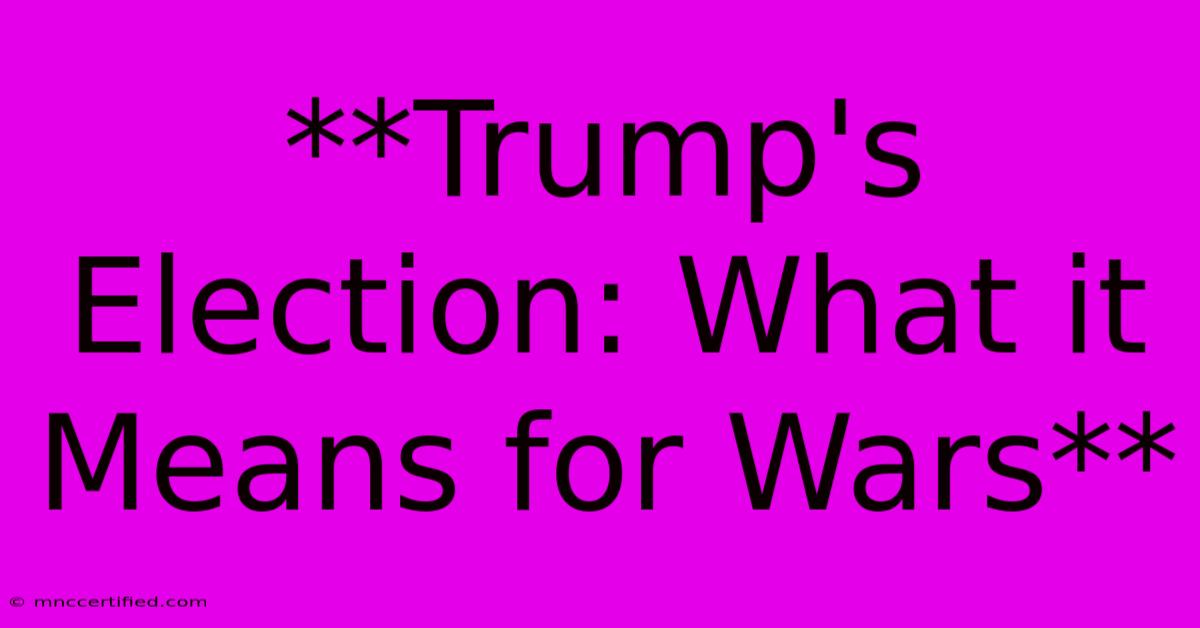**Trump's Election: What It Means For Wars**

Table of Contents
Trump's Election: What it Means for Wars
The election of Donald Trump in 2016 sent shockwaves through the global political landscape, and its impact on international relations and military engagements remains a subject of intense debate. While his campaign promises hinted at a more isolationist approach, Trump's presidency saw a complex mix of continuity and disruption in US military strategy, leaving experts and citizens alike pondering the future of wars.
A Shift Towards "America First"?
Trump's campaign slogan, "America First," signaled a potential break from traditional US foreign policy, emphasizing national interests over global commitments. This translated into a withdrawal from the Trans-Pacific Partnership trade deal, a renegotiation of NAFTA, and a more critical stance towards NATO allies.
On the military front, Trump's rhetoric promised a reduction in US military involvement abroad. He criticized costly interventions like the wars in Iraq and Afghanistan, suggesting a shift towards a more restrained approach to foreign entanglements.
Unforeseen Escalations
Despite campaign promises, Trump's presidency saw surprising escalations in military actions. The US increased airstrikes in Syria, imposed sanctions on Iran, and engaged in a trade war with China, all of which raised tensions and contributed to global instability.
The Syrian Civil War: Trump's administration continued the air campaign against ISIS in Syria, while also supporting the Syrian Democratic Forces (SDF) in their fight against the terrorist group. However, he also authorized the launch of missile strikes against the Syrian government in retaliation for a chemical weapons attack, demonstrating a willingness to intervene directly in the Syrian conflict.
The Afghanistan War: Although Trump initially promised to bring US troops home from Afghanistan, he later authorized a surge in troop deployment, highlighting the complexities of disentangling from the longest war in US history.
The North Korea Crisis: Trump's aggressive rhetoric and threats of military action against North Korea generated global concern, bringing the US closer to a potential nuclear conflict. While diplomatic efforts ultimately prevailed, the escalating tensions underscored the risks of Trump's approach to international relations.
A Legacy of Uncertainty
Trump's presidency left a lasting impact on US foreign policy and its role in global conflict. While his rhetoric emphasized a shift towards "America First," his actions revealed a complex mix of isolationist tendencies and aggressive interventions. This unpredictable approach generated uncertainty and instability, leaving a legacy that continues to shape US foreign policy today.
What Lies Ahead?
The long-term consequences of Trump's presidency on the nature of wars remain to be fully understood. His actions and rhetoric have undoubtedly influenced global perceptions of US power and its commitment to international cooperation.
Whether his administration's approach ultimately marks a fundamental shift in US foreign policy or merely a temporary deviation remains a question for future historians to answer.
Key Takeaways:
- Trump's "America First" rhetoric promised a more restrained approach to military intervention.
- Trump's presidency saw both troop withdrawals and increased military engagement in various conflicts.
- The long-term consequences of Trump's policies on US foreign policy and the nature of wars are still unfolding.
Further Reading:
- "The Art of the Deal: Trump's Approach to Foreign Policy" by Michael O'Hanlon and William Inboden
- "Trump's Foreign Policy: An Assessment" by Richard Haass
- "The Trump Doctrine: America's New Foreign Policy" by Edward Luttwak
Keywords: Trump, election, wars, military, foreign policy, America First, Syria, Afghanistan, North Korea, international relations, isolationism, intervention, legacy, uncertainty.

Thank you for visiting our website wich cover about **Trump's Election: What It Means For Wars** . We hope the information provided has been useful to you. Feel free to contact us if you have any questions or need further assistance. See you next time and dont miss to bookmark.
Featured Posts
-
Benfica Vs Bayern Kick Off Delay Explained
Nov 07, 2024
-
Florida Statute 720 Insurance Requirements
Nov 07, 2024
-
Tim Walz Back In Minnesota After Election Defeat
Nov 07, 2024
-
Stacking Insurance Policies South Carolina
Nov 07, 2024
-
Bayern Vs Benfica Starting Xis Confirmed
Nov 07, 2024